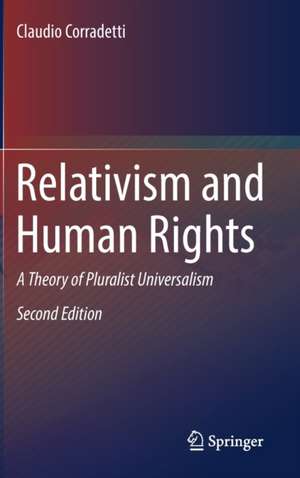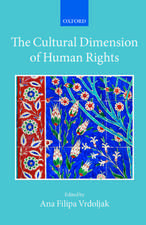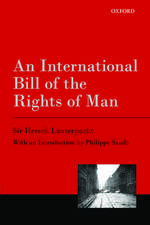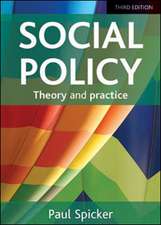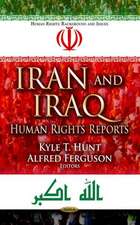Relativism and Human Rights: A Theory of Pluralist Universalism
Autor Claudio Corradettien Limba Engleză Hardback – 8 noi 2021
Pluralistic universalism considers that, while formal filtering criteria constitute unavoidable requirements for the production of potentially valid arguments, the exemplarity of judgmental activity, in its turn, provides a pluralistic and retrospective reinterpretation for the fixity of such criteria. While speech formal standards grounds the thinnest possible presuppositions we can make as humans, the discursive exemplarity of judgments defends a notion of validity which is both contextually dependent and "subjectively universal". According to this approach, human rights principles are embedded within our linguistic argumentative practice. It is precisely from the intersubjective and dialogical relation among speakers that we come to reflect upon those same conditions of validity of our arguments. Once translated into national and regional constitutional norms, the discursive validity of exemplar judgments postulates the philosophical necessity for an ideal of legal-constitutional pluralism, challenging all those attempts trying to frustrate both horizontal (state to state) and vertical (supra-national-state-social) on-going debates on human rights.
On the first edition of this book: “Claudio Corradetti’s book is a thoughtful attempt to find an adequate theoretical foundation for human rights. Its approach is interdisciplinary in nature, drawing on issues in analytical philosophy as well as contemporary political theorists, and the result is a densely argued text aimed at scholars … .” (Andrew Lambert, Metapsychology Online Reviews, Vol. 14 (3), January, 2010)
| Toate formatele și edițiile | Preț | Express |
|---|---|---|
| Hardback (2) | 652.64 lei 6-8 săpt. | |
| SPRINGER NETHERLANDS – 8 noi 2021 | 652.64 lei 6-8 săpt. | |
| SPRINGER NETHERLANDS – 27 apr 2009 | 727.48 lei 6-8 săpt. |
Preț: 652.64 lei
Preț vechi: 767.81 lei
-15% Nou
Puncte Express: 979
Preț estimativ în valută:
124.88€ • 130.39$ • 103.36£
124.88€ • 130.39$ • 103.36£
Carte tipărită la comandă
Livrare economică 04-18 aprilie
Preluare comenzi: 021 569.72.76
Specificații
ISBN-13: 9789402421293
ISBN-10: 9402421297
Pagini: 289
Ilustrații: XX, 289 p. 7 illus., 3 illus. in color.
Dimensiuni: 155 x 235 x 23 mm
Greutate: 0.76 kg
Ediția:2nd ed. 2022
Editura: SPRINGER NETHERLANDS
Colecția Springer
Locul publicării:Dordrecht, Netherlands
ISBN-10: 9402421297
Pagini: 289
Ilustrații: XX, 289 p. 7 illus., 3 illus. in color.
Dimensiuni: 155 x 235 x 23 mm
Greutate: 0.76 kg
Ediția:2nd ed. 2022
Editura: SPRINGER NETHERLANDS
Colecția Springer
Locul publicării:Dordrecht, Netherlands
Descriere
When he nished writing, he raised his eyes and looked at me. From that day I have thought about Doktor Pannwitz many times and in many ways. I have asked myself how he really functioned as a man; how he lled his time, outside of the Polymerization and the Indo- Germanic conscience; above all when I was once more a free man, I wanted to meet him again, not from a spirit of revenge, but merely from a personal curiosity about the human soul. Because that look was not one between two men; and if I had known how completely to explain the nature of that look, which came as if across the glass window of an aquarium between two beings who live in different worlds, I would also have explained the essence of the great insanity of the third Germany. PRIMO LEVI [If this is a man, pp. 111–112, in, If this is a man and The truce, trans. S. Woolf, Abacus, London, 1987] If all propositions, even the contingent ones, are resolved into identical propositions, are they not all necessary? My answer is: certainly not. For even if it is certain that what is more perfect is what will exist, the less perfect is nevertheless still possible. In propositions of fact, existence is involved. LEIBNIZ [Samtlic ¨ he schriften und briefe vol VI pt 4 Deutsche Akademie der Wissenschaften, 1449A VI 4] We live in a rule-constrained world.
Cuprins
Preface second edition.- Introduction second edition.- Part I.- 1 Cognitive Relativism and Experiential Rationality.- 1.1 Beyond Cognitive and Linguistic Relativism.- 1.2 Epistemic Relativism Refuted.- 1.3 The Experiential Validity of the Cognitive System.- 1.3.1 Judgement and Truth.- 2 Beyond Moral Relativism and Objectivism.- 2.1 Forms of Moral Relativism.- 2.2 The Two Horns of the Dilemma: Relativism versus Objectivism.- 2.2.1 Harman’s Inner-Judgments Relativism.- 2.2.2 The Limits of Nagel’s Objectivism in Morality.- 2.3 Wong’s Mixed Position: the Idea of Pluralistic Relativism.- 2.4 Discursive Dialectic of Recognition.- Part II.- 3 Human Rights and Pluralisitc Universalism.- 3.1 From Purposive Action to Communicative Action.- 3.1.1 Discursive dialectics and the processes of subjectivization.- 3.2 The Priority of Recognition and the Formal System of Basic Liberties .- 3.3 Human Dignity as an orienting principle of the universal system of human rights.- 3.3.1 Human Dignity as a Juridical Principle.- 3.3 The Exemplar Validity of Human Rights.- 3.4 Deliberative Constraints and Pluralistic Universalism.- 4 The Legal Dimensions of Human Rights.- 4.1 The Source and the Content Validity of Law.- 4.2 The Structure and Function of Human Rights.- 4.3 Transplantability and Legal Commensurability.- 4.4 What is Wrong in the Democratic Peace Theory.- Bibliography.- Index of names.- Index of topics.
Notă biografică
Claudio Corradetti is Associate Professor of Political Philosophy at the University of Rome Tor Vergata. He has been an undergraduate student at Oxford University and at the University of London, where he has obtained a Ma Philosophy. Once back in Italy, he has gained a doctoral degree at LUISS Guido Carli, Roma. Claudio has been trained also in law, having obtained a Diploma in European Public Law and an admission to the advanced seminars in international public law at the Hague Academy. Among his teaching records, he has taught at the University of Oslo and at the University of Graz, Austria.
He is a founder and co-chief director of the journal ‘Jus Cogens. A Critical Journal of Philosophy of Law and Politics’, Springer. Claudio has published extensively in Human Rights, Transitional Justice, the Frankfurt School and Immanuel Kant for Oxford University Press, Routledge, Sage, Cambridge University Press etc.
He is a founder and co-chief director of the journal ‘Jus Cogens. A Critical Journal of Philosophy of Law and Politics’, Springer. Claudio has published extensively in Human Rights, Transitional Justice, the Frankfurt School and Immanuel Kant for Oxford University Press, Routledge, Sage, Cambridge University Press etc.
Textul de pe ultima copertă
This is an innovative contribution to the philosophy of human rights. Considering both legal and philosophical scholarship, the views here bear an importance on the legitimacy of international politics and international law. As a result of more than 10 years of research, this revised edition engages with current debates through the help of new sections.
Pluralistic universalism considers that, while formal filtering criteria constitute unavoidable requirements for the production of potentially valid arguments, the exemplarity of judgmental activity, in its turn, provides a pluralistic and retrospective reinterpretation for the fixity of such criteria. While speech formal standards grounds the thinnest possible presuppositions we can make as humans, the discursive exemplarity of judgments defends a notion of validity which is both contextually dependent and "subjectively universal". According to this approach, human rights principles are embedded within our linguistic argumentative practice. It is precisely from the intersubjective and dialogical relation among speakers that we come to reflect upon those same conditions of validity of our arguments. Once translated into national and regional constitutional norms, the discursive validity of exemplar judgments postulates the philosophical necessity for an ideal of legal-constitutional pluralism, challenging all those attempts trying to frustrate both horizontal (state to state) and vertical (supra-national-state-social) on-going debates on human rights.
On the first edition of this book: “Claudio Corradetti’s book is a thoughtful attempt to find an adequate theoretical foundation for human rights. Its approach is interdisciplinary in nature, drawing on issues in analytical philosophy as well as contemporary political theorists, and the result is a densely argued text aimed at scholars … .” (Andrew Lambert, Metapsychology Online Reviews, Vol. 14 (3), January, 2010)
Pluralistic universalism considers that, while formal filtering criteria constitute unavoidable requirements for the production of potentially valid arguments, the exemplarity of judgmental activity, in its turn, provides a pluralistic and retrospective reinterpretation for the fixity of such criteria. While speech formal standards grounds the thinnest possible presuppositions we can make as humans, the discursive exemplarity of judgments defends a notion of validity which is both contextually dependent and "subjectively universal". According to this approach, human rights principles are embedded within our linguistic argumentative practice. It is precisely from the intersubjective and dialogical relation among speakers that we come to reflect upon those same conditions of validity of our arguments. Once translated into national and regional constitutional norms, the discursive validity of exemplar judgments postulates the philosophical necessity for an ideal of legal-constitutional pluralism, challenging all those attempts trying to frustrate both horizontal (state to state) and vertical (supra-national-state-social) on-going debates on human rights.
On the first edition of this book: “Claudio Corradetti’s book is a thoughtful attempt to find an adequate theoretical foundation for human rights. Its approach is interdisciplinary in nature, drawing on issues in analytical philosophy as well as contemporary political theorists, and the result is a densely argued text aimed at scholars … .” (Andrew Lambert, Metapsychology Online Reviews, Vol. 14 (3), January, 2010)
Caracteristici
This edition is a result of 10 years of research and engages with current debates through new sections
Contributes to the understanding of the conceptual status of human rights principles
Innovative contribution to the philosophy of human rights
Contributes to the understanding of the conceptual status of human rights principles
Innovative contribution to the philosophy of human rights
Recenzii
From the reviews:
“Claudio Corradetti’s book is a thoughtful attempt to find an adequate theoretical foundation for human rights. Its approach is interdisciplinary in nature, drawing on issues in analytical philosophy as well as contemporary political theorists, and the result is a densely argued text aimed at scholars … .” (Andrew Lambert, Metapsychology Online Reviews, Vol. 14 (3), January, 2010)
“Claudio Corradetti’s book is a thoughtful attempt to find an adequate theoretical foundation for human rights. Its approach is interdisciplinary in nature, drawing on issues in analytical philosophy as well as contemporary political theorists, and the result is a densely argued text aimed at scholars … .” (Andrew Lambert, Metapsychology Online Reviews, Vol. 14 (3), January, 2010)
